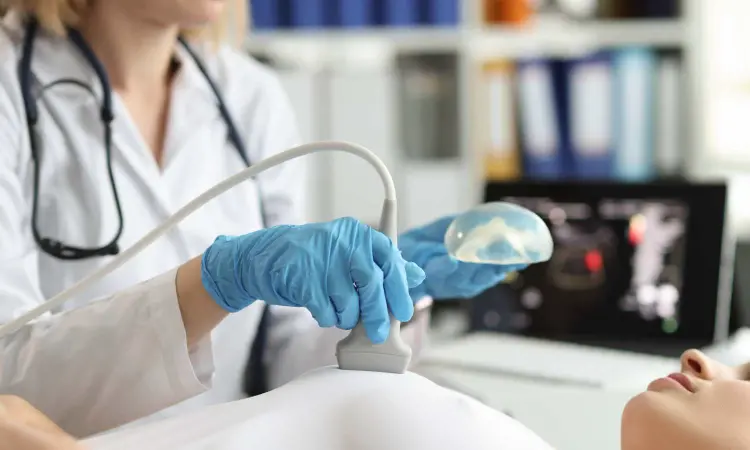- Home
- Medical news & Guidelines
- Anesthesiology
- Cardiology and CTVS
- Critical Care
- Dentistry
- Dermatology
- Diabetes and Endocrinology
- ENT
- Gastroenterology
- Medicine
- Nephrology
- Neurology
- Obstretics-Gynaecology
- Oncology
- Ophthalmology
- Orthopaedics
- Pediatrics-Neonatology
- Psychiatry
- Pulmonology
- Radiology
- Surgery
- Urology
- Laboratory Medicine
- Diet
- Nursing
- Paramedical
- Physiotherapy
- Health news
- Fact Check
- Bone Health Fact Check
- Brain Health Fact Check
- Cancer Related Fact Check
- Child Care Fact Check
- Dental and oral health fact check
- Diabetes and metabolic health fact check
- Diet and Nutrition Fact Check
- Eye and ENT Care Fact Check
- Fitness fact check
- Gut health fact check
- Heart health fact check
- Kidney health fact check
- Medical education fact check
- Men's health fact check
- Respiratory fact check
- Skin and hair care fact check
- Vaccine and Immunization fact check
- Women's health fact check
- AYUSH
- State News
- Andaman and Nicobar Islands
- Andhra Pradesh
- Arunachal Pradesh
- Assam
- Bihar
- Chandigarh
- Chattisgarh
- Dadra and Nagar Haveli
- Daman and Diu
- Delhi
- Goa
- Gujarat
- Haryana
- Himachal Pradesh
- Jammu & Kashmir
- Jharkhand
- Karnataka
- Kerala
- Ladakh
- Lakshadweep
- Madhya Pradesh
- Maharashtra
- Manipur
- Meghalaya
- Mizoram
- Nagaland
- Odisha
- Puducherry
- Punjab
- Rajasthan
- Sikkim
- Tamil Nadu
- Telangana
- Tripura
- Uttar Pradesh
- Uttrakhand
- West Bengal
- Medical Education
- Industry
Canadian Breast Cancer Guidelines Embrace Biennial Screening: A Shift in Approach

Canada: In a landmark update, the Canadian Task Force on Preventive Health Care (CTFPHC) has revised its guidelines for breast cancer screening, recommending that Canadian women at average breast cancer risk should undergo biennial or triennial screening and make decisions based on individual values.
The updated guidance on breast cancer screening, released on May 30, recommends that women between the ages of 40 to 49 not be systematically screened for the disease with mammography but rather make their screening decisions based on informed discussions with their primary care provider.
The guidelines differ slightly from the the recent U.S. Preventive Services Task Force (USPSTF) breast cancer screening guidelines, which recommended biennial screening, and do not support supplemental screening in women with dense breasts or with a family history of breast cancer.
“The risk-benefit in this category does not align with patient preferences and values, but we feel it’s very important that once that information is received if people want access, it should be there,” said Kate Miller, MD, from McMaster University in Hamilton, Ontario, Canada. Miller is a member of the task force.
The CTFPHC in February 2023 decided that the 2018 guidelines required updating. The group comprised six family physicians, four specialists, and two nurse practitioners; this recommendation update also involved a working group of a medical oncologist, a surgical oncologist, a radiation oncologist, a radiologist, and three patient partners. CTFPHC reviewed evidence from literature searches, systematic reviews, other data, and modeling and placed them into a decision framework.
For women aged 40 to 49, based on the current evidence, the group suggests not systematically screening with mammography. Because individual values and preferences may differ, those who want to be screened after being informed of the benefits and harms should be offered to be screened every 2 to 3 years (conditional recommendation, very low certainty).
"In ages 40 to 49, we found that the harms may outweigh the benefits," the group stated.
For women aged 50 to 74, the group suggests screening with mammography every 2 to 3 years. Because individual values and preferences may differ, women aged 50 to 74 must have information about the benefits and harms of screening to make their decision (conditional recommendation, very low certainty).
"In ages 50 to 74, we found that the benefits may outweigh the harms," the group stated.
For women aged 75 and above, the group suggests against screening with mammography (conditional recommendation, very low certainty).
"In ages 75 and above, there is a lack of information. But there is concern that the harms outweigh the benefits if screening continues beyond age 74," the group stated.
For women with moderately increased risk due to high breast density, the group did not find any evidence of the benefits of supplemental screening for outcomes important to patients (e.g., stage at diagnosis, death).
Therefore, they suggest against the use of MRI or ultrasound as supplementary screening tests for people with dense breasts (conditional recommendation, very low certainty).
For women with moderately increased risk due to a family history of breast cancer, the group did not find any evidence of the benefits of supplemental screening for outcomes important to patients (e.g., stage at diagnosis, death).
Therefore, they suggest against the use of MRI or ultrasound as supplementary screening tests for people at moderately increased risk due to a family history of breast cancer (conditional recommendation, very low certainty).
Reference:
Dr Kamal Kant Kohli-MBBS, DTCD- a chest specialist with more than 30 years of practice and a flair for writing clinical articles, Dr Kamal Kant Kohli joined Medical Dialogues as a Chief Editor of Medical News. Besides writing articles, as an editor, he proofreads and verifies all the medical content published on Medical Dialogues including those coming from journals, studies,medical conferences,guidelines etc. Email: drkohli@medicaldialogues.in. Contact no. 011-43720751


